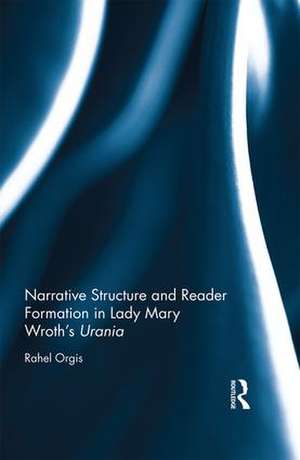Narrative Structure and Reader Formation in Lady Mary Wroth's Urania
Autor Rahel Orgisen Limba Engleză Hardback – 15 dec 2016
| Toate formatele și edițiile | Preț | Express |
|---|---|---|
| Paperback (1) | 389.38 lei 43-57 zile | |
| Taylor & Francis – 12 dec 2019 | 389.38 lei 43-57 zile | |
| Hardback (1) | 1056.28 lei 43-57 zile | |
| Taylor & Francis – 15 dec 2016 | 1056.28 lei 43-57 zile |
Preț: 1056.28 lei
Preț vechi: 1288.15 lei
-18% Nou
Puncte Express: 1584
Preț estimativ în valută:
202.12€ • 211.56$ • 168.23£
202.12€ • 211.56$ • 168.23£
Carte tipărită la comandă
Livrare economică 31 martie-14 aprilie
Preluare comenzi: 021 569.72.76
Specificații
ISBN-13: 9781472479754
ISBN-10: 1472479750
Pagini: 266
Ilustrații: 14
Dimensiuni: 152 x 229 x 16 mm
Greutate: 0.5 kg
Ediția:1
Editura: Taylor & Francis
Colecția Routledge
Locul publicării:Oxford, United Kingdom
ISBN-10: 1472479750
Pagini: 266
Ilustrații: 14
Dimensiuni: 152 x 229 x 16 mm
Greutate: 0.5 kg
Ediția:1
Editura: Taylor & Francis
Colecția Routledge
Locul publicării:Oxford, United Kingdom
Public țintă
Postgraduate and UndergraduateCuprins
Table of Contents
List of Tables and Figures
Acknowledgements
Introduction
Chapter 1: Entering the Urania through the Frontispiece
Abundance versus Lack
Reading the Lack of Prefatory Material
Reading the Abundance of the Frontispiece
Conclusions
Chapter 2: Narrator and Narratee: Guidance, Critical Sympathy and Discretion
The Gender-Neutral Narrator
Textual Guidance: Orientation and Cohesion
Sympathy and Criticism
The Art of Narration and Discretion
The Narratee
The Published First Part vs. the Manuscript Continuation
Chapter 3: Narrative Levels and Strands: Emotional Immediacy, Proliferation and the Promise of Closure
Narrative Levels
Narrative Strands
The Published First Part vs. the Manuscript Continuation
Chapter 4: Space and Displacements: Multiple Reading Modes and Tensions of Meaning
Reading Space and Settings
Spatial Movements and Travel Patterns
Chapter 5: Recurring Themes and Plots: Textually Inscribed Reflection and Debate
Recurring Themes and Plots
The Quest for Identity
Conquering and Defending a Throne
Love Matters
Courtship
Male Infidelity
Marriage
Supporting and Contrasting Inset Tales
Conclusion: Interpretive Freedom vs. Closure – The Story of Drusio and Isabella
Appendix
Bibliography
Primary Sources
Secondary Sources
Index
List of Tables and Figures
Acknowledgements
Introduction
Chapter 1: Entering the Urania through the Frontispiece
Abundance versus Lack
Reading the Lack of Prefatory Material
Reading the Abundance of the Frontispiece
Conclusions
Chapter 2: Narrator and Narratee: Guidance, Critical Sympathy and Discretion
The Gender-Neutral Narrator
Textual Guidance: Orientation and Cohesion
Sympathy and Criticism
The Art of Narration and Discretion
The Narratee
The Published First Part vs. the Manuscript Continuation
Chapter 3: Narrative Levels and Strands: Emotional Immediacy, Proliferation and the Promise of Closure
Narrative Levels
Narrative Strands
The Published First Part vs. the Manuscript Continuation
Chapter 4: Space and Displacements: Multiple Reading Modes and Tensions of Meaning
Reading Space and Settings
Spatial Movements and Travel Patterns
Chapter 5: Recurring Themes and Plots: Textually Inscribed Reflection and Debate
Recurring Themes and Plots
The Quest for Identity
Conquering and Defending a Throne
Love Matters
Courtship
Male Infidelity
Marriage
Supporting and Contrasting Inset Tales
Conclusion: Interpretive Freedom vs. Closure – The Story of Drusio and Isabella
Appendix
Bibliography
Primary Sources
Secondary Sources
Index
Notă biografică
Rahel Orgis is a postdoctoral researcher on behalf of the University of Neuchâtel, Switzerland and coordinator for the English doctoral programme of CUSO (Conférence universitaire de Suisse occidentale).
Recenzii
"Rahel Orgis's Narrative Structure and Reader Formation in Lady Mary Wroth's "Urania" marks a milestone on two fronts. It sets up an inductive narratological procedure for appreciating Wroth's experimental design in the complex discursive terrain of Urania and thereby makes significant advances over classical narratological theory (Gérard Genette, et al.) as equipment for reading early modern prose romances. Orgis's careful attention to the interplay between narrative levels and strands and geographic mappings of "travel patterns" (p. 10) in Urania provides readers with an enormously helpful way to understand the narrative tactics underpinning Wroth's brand of romance-inflected cosmopolitanism. (261)." -- Gallagher, Lowell. "Recent Studies in the English Renaissance." SEL Studies in English Literature 1500-1900, vol. 58 no. 1, 2018
"The book is very well researched, extremely rigorous in its analysis, and methodologically consistent. The book also opens up genuinely new paths for the study of Lady Mary Wroth’s Urania, as well as other prose texts of the early modern period. Rahel Orgis’s work will be particularly useful for developing new critical narratives around women writers of the early modern period. Indeed, Orgis’s appendices alone – a series of detailed charts which lay out the narrative structure of Urania from different perspectives – will be of great value to early modernists specializing in Wroth or early modern romance." -- SAMEMES Early Career Book Prize, Sep. 2018
"The book is very well researched, extremely rigorous in its analysis, and methodologically consistent. The book also opens up genuinely new paths for the study of Lady Mary Wroth’s Urania, as well as other prose texts of the early modern period. Rahel Orgis’s work will be particularly useful for developing new critical narratives around women writers of the early modern period. Indeed, Orgis’s appendices alone – a series of detailed charts which lay out the narrative structure of Urania from different perspectives – will be of great value to early modernists specializing in Wroth or early modern romance." -- SAMEMES Early Career Book Prize, Sep. 2018
Descriere
Narrative Structure and Reader Formation in Lady Mary Wroth’s Urania offers the first systematic formal and thematic analysis of Wroth’s Urania in its historical context and explores the structural means by which Wroth fashions her readership. The book thus has a dual focus, at once on narrative art and reader formation. It makes two original claims, the first being that the Urania is not the unorganized accumulation of stories critics have tended to present it as, but a work of sophisticated narrative structures i.e. a complex text in a positive sense. The second claim is, then, that through the careful structuring of her text Wroth seeks to create her own ideal readership.
